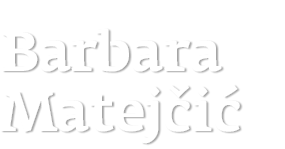In Veles, a run-down city in Macedonia, a discrete but prosperous sector is booming – the fake news industry. Hitting the headlines during the US elections, the industry is in the hands of young people with in-depth knowledge of the social media and their followers. Without any prospects of finding decently paid work, they have occupied this niche in the digital economy – and are doing very well out of it. Yet there are certain red lines they are not prepared to cross.
By Barbara Matejčić
Photos by: Robert Atanasovski
Croatian version
“This is for the great people of Veles, I couldn’t do it without you!”. Here in Veles, a run-of-the-mill city in the centre of Macedonia, I’m shown a tweet from Donald Trump dated 9 November 2016. The day he won the US presidential election. Trump never visited Veles, 7553 kilometres away from New York City, but a large number of Veles inhabitants “worked for him” during the election campaign. The tweet is fake, Donald Trump never wrote it. It’s a joke on account of so many fake news launched from Veles in a favour of Donald Trump during the campaign.
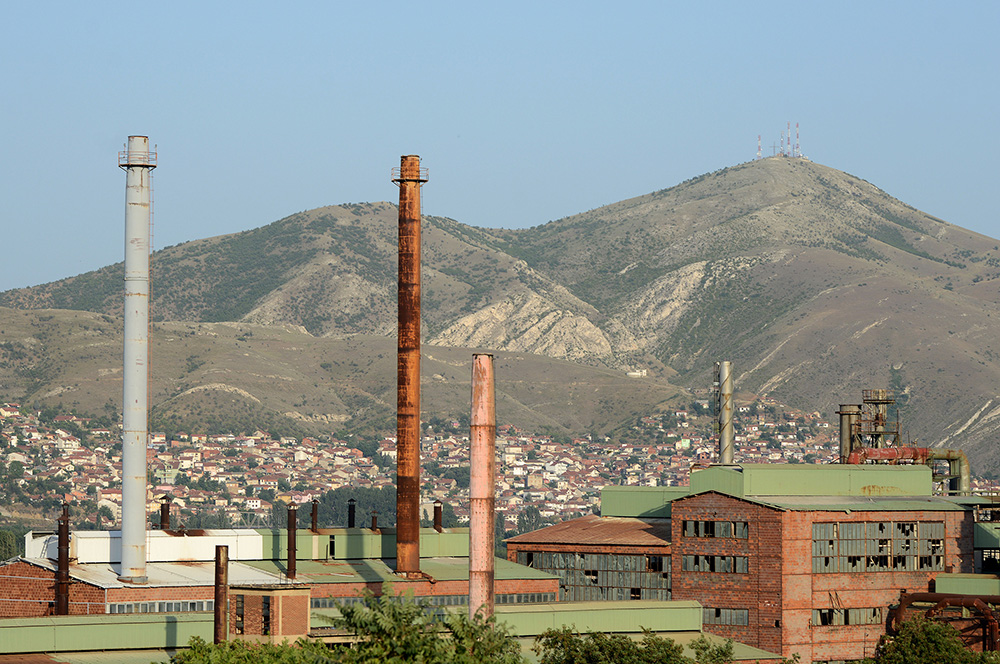
In 2016, a gold rush took hold of this 43,000-inhabitant city, formerly an industrial centre but now impoverished. Hundreds of websites, including WorldPoliticus.com, TrumpVision365.com, USConservativeToday.com, DonaldTrumpNews.com, USADailyPolitics.com first saw the light of day here. They publish mostly fake news benefiting the Republican candidate with a headlines as: “Hillary Clinton in 2013: I would like to see people like Donald Trump run for office; They’re honest and can’t be bought”; “Wow! Queen Elizabeth invited Trump – This is a game changer”; “This is why we need Trump in the White House”. The Guardian was the first to become interested in Veles, with its journalists naming more than 150 web domains registered in this provincial city in the heart of Macedonia in August 2016. Since then, the number of websites launched in Veles has shot up so much that nobody is now able to come up with an exact number.
A monument to Trump
“We need to erect a monument to Donald Trump. So many people have made a money out of him. 50% of the young population here are or were involved in the websites. I reckon that we had 3000 – 5000 websites active during the US elections. But that number has now gone down to about 200”, said Bojan, lighting up a Marlboro while looking at his iPhone. “Here, take a look at my baby. Looks good, doesn’t it?”, he proudly says. The design is simple, without frills, the texts short, the titles juicy – and all is spiced with lots of photographs and prominent ads. “Everything I own, I owe it to these ads”, he added, wiping the sweat from his forehead. It’s the end of June, and temperatures are up to 30 degrees.
Bojan is just 19. It’s not his real name. Nobody in Veles would willingly reveal their true identity to a reporter investigating how fake news is produced. With Google and Facebook increasingly often blocking their sites, they don’t want the story of the Veles digital miracle to spread. They prefer to remain anonymous, also because they’re afraid of threats. Indeed, if the racketeers were to find out how much they earned, they would soon come knocking on their doors and demanding a share of profits.
Bojan finished a high school of economics in 2016, one of the four high schools in Veles. His family of four scraped by on the €230 a month earned by his father in a factory making car spares. Many years ago, his father used to work in the Zletovo zinc and lead foundry, the largest factory of its kind in the former Yugoslavia.
This plant provided Veles not just with large numbers of decently paid jobs, but also gave the city the unenvied title of one of the most polluted cities in the Balkans. The plant is now closed, a fate shared by many other factories in the city. His mother is unemployed, as is the case with 25% of Macedonians. Bojan intended to work for a couple of years, saving up enough money to go to Skopje, the capital of Macedonia just 50km down the road, to study. But finding a job in Veles is quite a challenge. With a bit of luck, he might have got a job as a machine feeder in the factory like his father. But all he would have made there would have been €250 a month, hardly enough to get together the money needed to go away and study.
“Renting an apartment in Veles costs €100 a month. With more than €100 in expenses and €200 for food, you’re already up to €400. There’s no work here paying that sort of money. I started looking around for possibilities to work abroad. Lots of young people from here have gone off to work on cruise ships in America. But then, in the summer of 2016, people started talking about making money from websites. I previously had no idea what the term fake news meant.” Working with a couple of schoolmates, it took them just seven days to learn on the Web how to make money on the Internet.
“The money’s there waiting for you. All you have to do is to buy a domain name and create a web page. Something simple on WordPress.com, something that looks serious, but without needing to invest too much effort because hardly anyone is going to actually look at the website. Instead, they’ll just be clicking on the news relayed via the social media. Next step, you add content to your page. You look for news on foreign sites. It doesn’t matter whether it’s fake or not. You might want to make a couple of changes to the content, but the main thing is to add a prominent title. And you prefix the title with Shocking, Breaking news or Spread this!. You then register with the advertising networks, for example Google AdSense, which automatically add ads to your site. You publish your text in various Facebook groups of Trump supporters – such as Reclaim America, Trump Troopers 2017 or Trump Train – and then you just wait for them to click on the text, and then on the ads. That’s when the dollars start rolling in”, explained Bojan.
The hunt for US clicks
However, it took quite some time for the clicks to transform into dollars. Bojan and his two friends earned just $50 in the first month. The number of followers of their website’s “fanpage” on Facebook was not that high, and they didn’t have enough money to invest in advertising on Facebook. And none of their news went viral. Nevertheless, each of them spent the whole night in their rooms in parent’s apartments searching for the Facebook pages most often visited, opening new profiles and dreaming up increasingly effective headlines. As the audience for their texts grew, and thus their profits, they invested more and more in Facebook ads, giving them greater visibility and thus more clicks.
In October 2016, just three months after launching their site, they netted their first thousand dollars, around the amount their respective fathers together earned in one month. The following month, they raked in $3000. After 11 months, their total amounted to $65000, a fortune in a country with an average monthly wage of €372.
“Our business is not that big. There are others here in Veles who made more than a million euros”, stated Bojan. Seeing my surprised look, he was quick to add: “And that’s not fake news, it’s the truth. You’ll see it next year on the tax declarations. They belong to those rare people whose Facebook “fanpages” have more than 800,000 followers and who spend €200 – €300 a day on Facebook advertising. Such high investments generate lots of clicks. US clicks. They’re worth much more than all the others.”
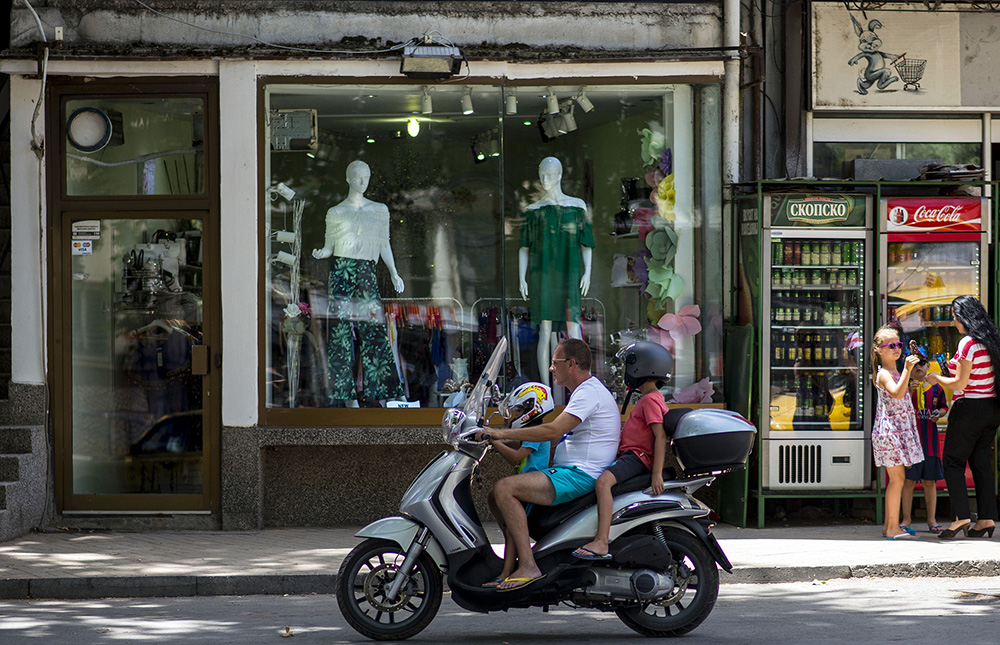
The Veles entrepreneurs create sites targeting the US market because clicks from US are the worthiest in the world and they produce news on Trump because his supporters are the most inclined to click on it. Yet nobody is really interested in Trump and the majority of Macedonian fake news producers don’t follow US politics. At the beginning, a few of them posted news benefiting Hillary Clinton, but they quickly noticed that this didn’t bring in that many clicks. So they switched sides and focused on Trump. “We post fake news for just one reason: audiences for fake news are bigger than for real news”, they say as justification.
The most-read news item on Bojan’s website is the one about the Pope supporting Trump. Though not invented in Veles, many of the city’s websites posted it. Generally speaking, rather than inventing news, they copy it from US websites such as TheRightists.com, Conservative101.com, Angrypatriots.com, Libertywriters.com. And anyway, most youngsters like Bojan don’ have sufficient command of English to write faultless fake news. On the other hand, a few top players may employ up to 8-10 people, including foreigners speaking English fluently. Work is shared – someone scans the Web for news, another for photos. Someone dreams up the titles, two others take care of posting the content on the social media. Someone else does the translating.
Facebook is reacting
Once upon a time, the Veles factories produced clothing and china sold throughout Yugoslavia. Nowadays, small workshops assemble fake news for the US market. The members of this new digital workforce earn €350 – €500 a month for their work. By comparison, the national TV correspondent in Veles earns €300 a month.
Bojan’s team has stayed the same size, with the three of them still doing everything themselves and sharing the profits. They dispense with everything that makes media work expensive – the work of editors, photographers, graphic designers, the marketing, the technical equipment. Installed in a sparsely-furnished rented apartment in one of those high-rise concrete buildings typical of the Communist era, they start work around 4 o’clock in the afternoon so that they can supply their readers on the other side of the Atlantic with fresh news when they check their Facebook thread in the morning. They work until around 3 am and sometimes take turns to work through the night. They live by US time.
When the audience for political news melted away after the elections, they decided to refocus their work, launching two new sites, the one devoted to cars, the other to food. But the principle remains the same: they copy news articles, add ‘juicy’ titles, and post them on the social media. “That’s not bringing in that much at the moment, but we’re patient and determined. At the same time, we’re beefing up our political site in preparation for the next US elections”, explained Bojan.
Over the last few months, Facebook has deleted several pages from sites in Macedonia due to breaches of usage terms and conditions. This is tantamount to killing these businesses, as 95% of site visitors come from Facebook. Some of them didn’t received payment from Google for their advertising profits, mostly because the content was plagiarised. Although Google has profited from their fake news or rather from the ads posted on their pages, the share due to the site owners has not been paid. As a result, Bojan and his friends have changed their subjects and are posting more videos on their sites, as such content is not checked so much.
“Healthy food brothers”
In Veles, the era of digital fake news actually started with food. The precursors of the golden age were the famous Healthy food brothers, Borče and Aleksandar Velkovski, the brothers responsible for launching Healthyfoodhouse.com They posted texts full of health and beauty advice, such as “putting a slice of lemon near your bed lets you wake up feeling top fit”, or “eating bananas and avocados instead of pills is the best way to cure depression”.
“About two and a half years ago, I heard about guys running a website on healthy food. At the beginning, they had us smiling, but once we saw their gleaming car and renovated house, the jokes have stopped. Some have followed suit, setting up sites for food, cars, lorries, sport, etc.”, said 21-year-old Aleksandar Stojkovski, a law student who works as a lifeguard at the city’s swimming pool. He is also a member of the NGO Focus, where he works on information technologies. It was only when Trump was nominated as the Republic candidate that Veles became a gold vein for new digital workers. Rumours cropped up that Russia was providing the funding for the sites, but Aleksandar doesn’t believe that. “It was just a few lads with nothing better to do. They found a new way of making money, basically because you’ve got no other choice here. Like in the old days, everybody’s working in the factory; it’s just that the factory is now churning out fake news. Without the Healthy food brothers, probably nothing would have existed”, thought Aleksandar.
Like the majority of people we spoke with, he was not condemning the youngsters producing the fake news, even if he himself would have nothing to do with it. “As a student activist, I was hoping for honest elections in Macedonia. I fought against a corrupt government and the fake news put out by the Macedonian media. Broadcasting fake news myself would go against all my ethical principles.”
He went on to say: “Macedonia is in economic ruins, there’s no work for young people. Can we honestly take their spreading of fake news amiss in a country in which up to just a few months ago the national TV channel broadcast nothing but lies? On the TV, you heard about jobs being created, about prospects being rosy. But go out onto the streets and you would find people demonstrating, people were poor and the entire political system was corrupt. That’s the real problem. Not the kids who post fake news for the Americans. You don’t have to read that sort of news. But we pay for the national TV channel to lie to us, so where do you think young people are going to learn that the truth counts?”
Nothing that endangers lives
We talked on the main Petre Prličko street, opposite the brand-new Džinot Theatre. Cafés and shops align this unimpressive artery, but the new jeunesse dorée doesn’t find much here to show off its riches. A mobile phone, brand sneakers, a restaurant dinner, a bottle of whisky, that’s all they can treat themselves to here – unless they go and spend their money in one of the many casinos that have sprung up.
The theatre is the only new public building constructed in the city since the disintegration of Yugoslavia in 1991. No kindergarten, no sports hall, no cinema or no new hospital has been built. In June 2017, after 11 years of the conservative VMRO-DPMNE government, a new government was formed by the social democratic SDSM party. Two websites were set up just before the elections, Saznajemo.rs (“We are learning”) and Alo.com.hr, disseminating fake news in the hope of discrediting the opposition. Nova TV, one of the rare independent media channels, discovered that the two sites were under the control of New Media Enterprise, a company belonging to Filip Petrovski, the director of the National Archives of Macedonia and a member of the VMRO-DPMNE party then in power.
The Veles “lads” did not get involved in the Macedonian elections. “There was nothing to earn from the UK or French elections, and even less from the Macedonian elections. Ad clicks aren’t worth much in Europe, and readers here are not as gullible as the Americans. In the elections here, we left the posting of fake news up to the politicians. What we are interested in is making money”, smiled Bojan.
He went on to explain: “But I’m not prepared to post any news whatsoever just for the money. For example, I came across some fake news saying that Syrian terrorists were about to attack New York. That’s something you can’t take lightly.” His credo is not to post anything that could endanger lives. Everything else is acceptable.
“I’m having more difficulties with our food website. This type of site could tell you that this or that food can help cure cancer, but that might be wrong and could endanger people’s lives. But I’ve got no scruples with fake political news, because politics is full of charlatans anyhow”, he said.
The young man has postponed his planned registration at the Faculty of Economics. “I’m going to continue with this as long as it goes well, trying to save as much money as possible. That will probably get more and more difficult, because war has been declared on fake news. Anyway, it’s not a real job, even if I’m earning much more than any other work here in Macedonia”, he added. As with all other digital workers in Veles, Bojan is not officially employed, and he is not paying any pension or social security contributions. He considers his savings to be his best insurance policy.
The Frankfurt Mafia
The mayor, Slavčo Čadiev, received us in his office. It’s 7 pm. “Times are hard, I’ve got to work”, he said. He’s a member of VMRO-DPMNE, the right-wing conservative party that governed the country until recently. We asked him about the city’s unemployment rate. He didn’t know it exactly, but supposed it was somewhere around 8 – 10%. What was the youth unemployment rate? He didn’t know, but he stated that it was quite low. How many young people had left Veles to go and work abroad? Again, he didn’t know.
Somewhat later, his spokesman Orce Nikolov passed on to us data stating that the unemployment rate in Macedonia was 24.5%, and that it was of the same order of magnitude among young people. There was no official data on the number of Macedonians working abroad. The mayor evidently knew that Veles had gained a bad reputation on account of its fake news industry, but that didn’t seem to worry him: “The lads are getting by. They haven’t breached any law in Macedonia and they’re paying their taxes.” He did however admit that the community had not benefited from it: “They only profit from it themselves. You see more fancy cars in the streets, but the money is not finding its way into the city economy.”
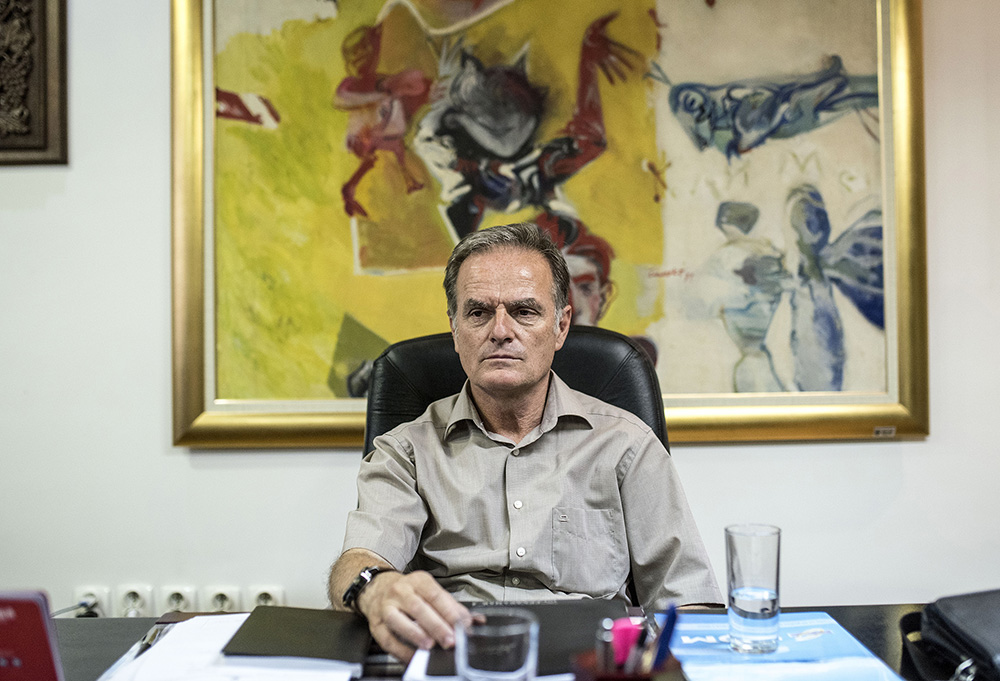
“It’s a bit like it used to be with what we called the Frankfurt Mafia, but less dangerous”, Ace Kocevski, the former mayor of Veles, told us. After his defeat in the 2009 elections, due to a fraudulent set-up with duplicate ID cards which allowed people to vote more than once, he started up a construction company. The Frankfurt Mafia was the name given to a group of Macedonian criminals, most of whom originally came from Veles, who sold drugs in Frankfurt and Vienna which had come up via the Balkans route.
The Mafia recruited young people, sending them to “work” in Germany and Austria. Rumour had it that some 400 Veles inhabitants participated in these activities. The dismantling of this criminal organisation began in 2009 and dozens of people have since been arrested. “You can put that down to unemployment. Everybody was fighting for the same scrap of bread. I’m not justifying it, but I can understand it. It’s the same thing with today’s fake news”, declared Kocevski.
Borče Pejcev is a web designer and programmer. He’s never been short of work. He had set up 200 – 300 fake news sites, he said, among them the first political site conceived in Veles. That was back in November 2015. It was called Usapoliticstoday.com. Though Borče has earned well through the digital boom in Veles, he himself has no website of his own and is not involved in fake news. He doesn’t need to. He knows lots of people working in this business and he can confirm that they are not a new professional workforce.
“They’re all just amateurs. All they understand about the technology or the Internet is what they need for their business. Moreover, they don’t think about what they will do when the source dries up, when they get blocked by Facebook and Google. They’re not investing in new opportunities, not starting up new companies. They’re spending their money on fancy cars, holidays in Thailand, shopping on AliExpress.com, expensive bottles of alcohol at the weekend. Though quite rare, maybe one of them will open a café with the money he’s made. They’re young people who’ve made money quickly and want to enjoy themselves”, he explained.
A decent life
Elena doesn’t dream about trips to faraway countries or luxury cars. She just wants a decent life for her family. 34 years old, she teaches physics at a high school in Veles. Her monthly salary is €370. Her husband is a taxi driver and earns €200 a month. They have a 4-year-old daughter and Elena is 4 months pregnant. We met up in the Gardenia, the best hotel in town on the outskirts of Veles, to avoid her being seen in the company of a journalist. What is now a 5-star hotel used to house the admin departments of Loza, a large agricultural cooperative that went bankrupt.
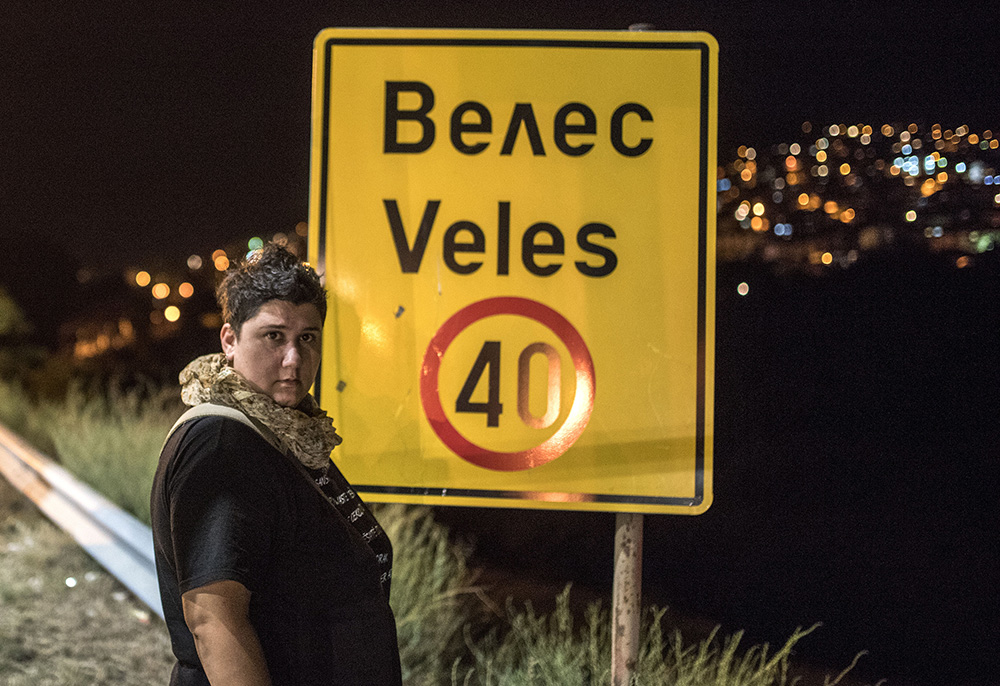
“I’ve got a degree and a good job, but I live on the breadline. That’s why I set up my own website in April 2017. Everyone said that it was easy to make money that way, so I gave it a try”, she said. As with all the others, she taught herself everything she needed to know on the Internet, because nobody wanted to help her get it running. She designed the site herself and paid $42 for the domain name Americantodayreport.com. Her audience swelled after just two days, after she posted a news item on the conflict between North Korea and the US. Elena generally posts juicy news items about Trump, but no fake news.
“Ethically, I find that unacceptable. Anyway, readers are increasingly recognising fake news, posting the comment fake news under such items and you end up getting blocked in this group and losing your audience”, she explained.
During the day, she searches for news items on such well-known media sites as the New York Times, The Independent, The Guardian or the Daily Mail, then assembles them and posts them on her site. Around midnight, she starts sending out the links from her kitchen while her husband and daughter calmly sleep. On the Facebook groups where she posts under her own name, she often discovers posts from her pupils.
“If the kids manage to earn money this way, then I can manage to do it as well”, she said. Nevertheless, up to now she has only earned €80. “I work just a few hours a day on it, posting up to seven news items. But obviously, that’s not enough. During the summer holidays, I’ll step up my work. I’d be happy just to earn a few hundred euros a month”, she told me.
While we were talking near the hotel swimming pool, her brother’s girlfriend rang her up. She and her brother had wanted to do seasonal work in the summer in neighbouring Greece. They had paid €100 per person to an agency in Skopje which had ensured them they would be hired. But they had heard nothing since. “That’s life in Macedonia. Everyone deceives you”, says Elena. Her brother now plans to start up a food website.
From the neighbouring table, we picked up snatches of conversation from a group of well-dressed middle-aged men having dinner. They were speaking of Facebook and advertising on the social media. When we left the hotel and we were crossing the former industrial zone in the car, Elena tugged my sleeve: “Do you see those two over there?”, she said, pointing to two young men in the half-light. “They’re into politics, broadcasting fake news”, she said. Small Veles has become the Mecca of the post-factual era.
